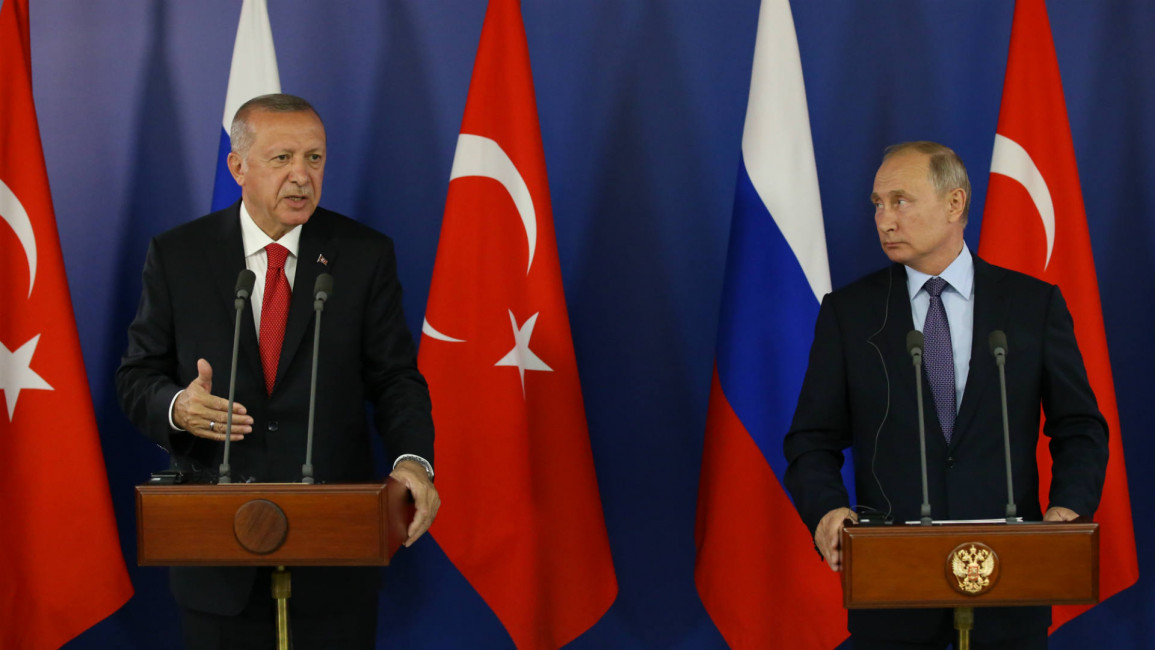Mixed messages from Turkey, Russia over 'Idlib deal'
While Russian President Vladimir Putin indicated an agreement with his Turkish counterpart, Recep Tayyip Erdogan, over expelling "terrorists" from northwest Syria, the Turkish president vowed "self-defence" if his troops in Idlib come under fire from the regime.
Erdogan's comments came just days after a Turkish military convoy travelling to resupply an "observation point" in Idlib was targeted by a suspected Syrian regime airstrike.
Turkey claimed the airstrike killed three civilians, though a war monitor said a Russian air raid took the lives of three rebels in the surrounding area.
Turkey said it would not quit the observation post despite it being reportedly surrounded by troops loyal to the Syrian regime with Damascus' threatening to "eliminate" the military outpost.
As Turkish and Russian relations grow warmer - with Moscow selling Ankara its S-400 missile defence system in a controversial deal earlier this year - an agreement between the two leaders over the Syrian conflict - who have backed opposing sides - has become more likely.
Erdogan and Putin last year brokered a deal for the so-called "de-escalation zone" in Idlib that fell apart in late April when Damascus and its ally Moscow ramped up a fierce bombardment of civilian targets in the northwestern province and entered into a ground battle to reconquer the rebel-held region.
"The situation in the Idlib de-escalation zone is of serious concern to us and our Turkish partners," Putin said on Tuesday at the joint press conference after talks with the Turkish president near Moscow.
Read more: Syria Weekly: Regime advance in Idlib threatens genocide of Syrians
He also claimed that the two leaders had agreed "additional joint steps" to "normalise" the situation in Idlib and root out "terrorists" there.
Some of the Idlib rebel forces are backed by Turkey, but the majority of the area is controlled by Hayat Tahrir al-Sham (HTS), the Syrian former Al-Qaeda affiliate.
Erdogan, however, struck a different note, saying that recent attacks by Syrian regime troops had disrupted the calm introduced in the region by Russia and Turkey.
Such attacks are unacceptable, he said, adding that Ankara would use its right to self defence if necessary.
Rebels in Idlib province on Tuesday launched a counter-attack against the regime advance that took the key town of Khan Sheikhoun last week.
"We launched pre-emptive operations that targeted areas where the army was mobilising and were able to inflict heavy losses in equipment and lives," said a spokesman for the Turkey-backed National Liberation Front (NLF) coalition of rebel groups, according to Reuters.
The rebels hope to cut off the advance before it reaches the town of Maarat al-Nouman.
If the regime advance is successful, it would take regime troops into the more densely populated areas of Idlib, where millions of people who fled airstrikes and conflict elsewhere have fled.
Civilian casualties in the Idlib assault have already been devastating, but rights organisations have warned that 3 million civilians are at risk of "annihiliation" if the regime advance proves successful.
Airstrikes have killed more than 900 civilians since late April, including 237 children, according to SOHR, and the fighting has left more than a thousand fighters on each side dead.
Heavy regime and Russian bombing has emptied large parts of southern Idlib and Hama, with more than 850,000 people have been uprooted since the regime began bombing Idlib in February.



